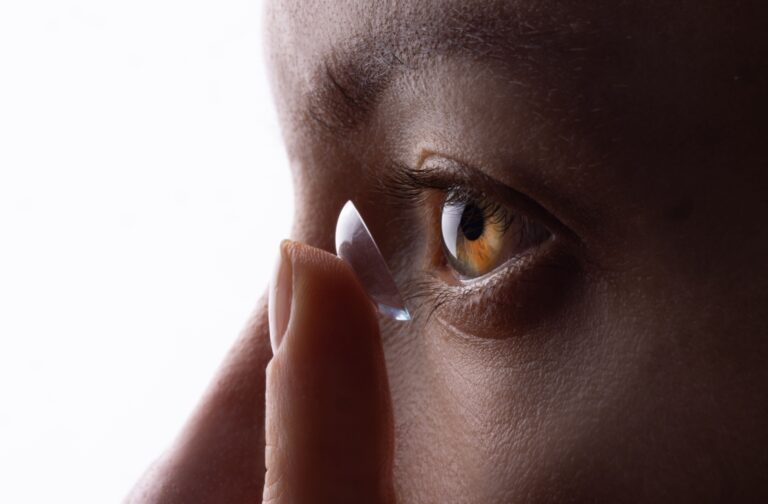
Contact lenses have come a long way since their early days. With new materials and fitting technologies, today’s lenses are more comfortable and versatile than ever before.
For patients exploring contact lens options, one of the most common distinctions is between soft and hard lenses. Soft contact lenses are typically more comfortable and easier to adapt to, while hard contact lenses offer sharper vision and are often better suited for certain eye conditions.
At Tree City Eyecare, we offer a wide range of contact lenses, including soft, hard, and specialty varieties. Understanding the fundamental differences between these two types is the first step toward clearer, more comfortable vision.
What Are Soft Contact Lenses?
Soft contact lenses are made from flexible plastic materials that allow oxygen to pass through to the cornea. These lenses are thin, pliable, and conform to the surface of the eye.
Soft lenses are widely used for common refractive errors like nearsightedness, farsightedness, astigmatism, and presbyopia. Many people find them easy to adapt to, making them a popular choice for first-time contact lens wearers.
Soft lenses come in a variety of wear schedules, including daily disposables, bi-weekly, and monthly lenses. The ability to replace your lenses frequently can contribute to eye comfort and hygiene, especially for those prone to irritation or buildup.
Features of Soft Lenses
- Lightweight and comfortable from the first wear
- Available in various replacement schedules
- Suitable for most basic vision correction needs
- Conform to the shape of the eye for a natural feel
- Offer UV protection in select models
What Are Hard Contact Lenses?
Hard contact lenses, also called rigid gas permeable (RGP) lenses, are made of durable plastic materials that maintain their shape on the eye. Unlike older hard lenses, modern RGP lenses are breathable and designed to support long-term eye health.
Because RGP lenses hold their shape, they can provide sharper vision in some cases, particularly for people with irregular corneas or advanced astigmatism. They’re often used in specialty lens fittings for patients with keratoconus, post-surgical corneas, or other complex eye conditions.
Although they may take longer to adjust to than soft lenses, many people find that the long-term clarity and customization options are worth it.
Features of Hard Lenses
- Offer crisp, stable vision
- Durable and long-lasting with proper care
- Often custom-made for unique eye shapes
- Ideal for irregular corneas or specialty vision needs
- Typically worn on a longer replacement schedule
Key Differences Between Soft & Hard Lenses
The most noticeable difference between these two types of lenses is how the lenses feel. Soft lenses mold to the eye, which can make them more comfortable initially. Hard lenses sit on the tear film above the cornea, which may take some getting used to but can provide more precise vision.
Another important difference is maintenance. Soft lenses are generally thrown away more frequently, depending on the wear schedule. Hard lenses require cleaning and storage each night but tend to last much longer when cared for properly.
Adaptation time also varies. Most people adjust to soft lenses within a day or two, while hard lenses may require a short period of consistent wear to feel completely natural. However, some patients find the long-term comfort of RGP lenses improves as the eye adapts.

Who Benefits Most from Which Kind of Lens?
Each kind of lens is best suited to different health and vision needs.
Soft Lenses
Soft lenses are typically a good match for people with standard prescriptions who want convenience and comfort. They’re also helpful for those who wear contacts occasionally, such as during sports or social events.
Their flexible structure makes them a good choice for:
- New contact lens wearers
- People with active or unpredictable schedules
- Those prone to dryness or eye sensitivity
- People who prefer disposable options with minimal upkeep
Hard Lenses
Hard lenses are often recommended for people with more complex vision needs. Since they don’t change shape on the eye, they can mask certain corneal irregularities and offer sharper focus than soft lenses in some cases.
They may be a good fit for:
- People with keratoconus or corneal scarring
- Those with high levels of astigmatism
- People seeking a long-term solution with less frequent replacement
- Individuals who haven’t achieved good vision correction with soft lenses
Factors to Consider When Choosing a Lens
Choosing between soft and hard lenses depends on several factors, and what works for one person may not be right for another. A thorough contact lens exam can help guide your decision based on:
- Vision prescription and eye health
- Comfort preferences
- Routine and lifestyle habits
- Willingness to care for and maintain lenses
- Prior experiences with glasses or contacts
During a contact lens consultation, we’ll review your options, answer questions, and offer trial lenses when appropriate. Follow-up appointments help fine-tune the fit and confirm that your lenses support your comfort and vision.
A Personalized Approach to Vision
Contact lenses should enhance daily life, not complicate it. Whether you choose soft lenses for flexibility or hard lenses for sharper vision, what you want is lenses that fit your routine and support your long-term eye health. At Tree City Eyecare, we approach contact lens care with professionalism, precision, and kindness. With so many lens types available today, there’s likely a good match for most vision needs; it’s just a matter of finding it with the right guidance and technology.




